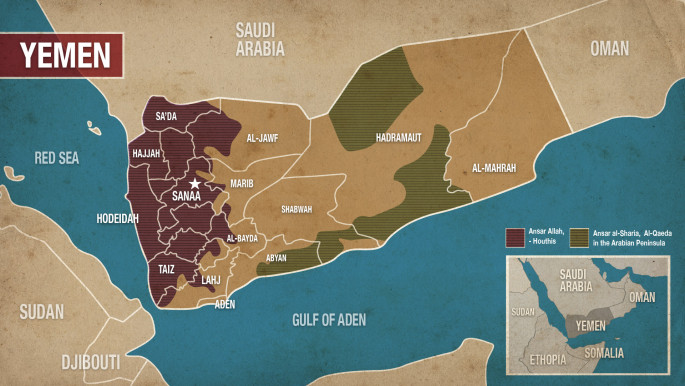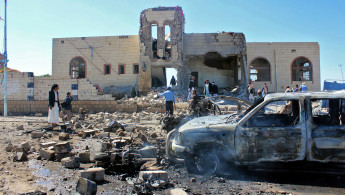Saudi Arabia's life or death mission in Yemen war
Last week, the Saudi-led coalition intercepted a ballistic missile over Riyadh. The Houthis claimed responsibility for the attack, saying the missile targeted the Yamama Palace in Riyadh. The range of such a Houthi missile has been further a shocking eye-opener for Saudis. Previously, a ballistic missile was intercepted near a vital international airport in Riyadh on November 4.
On December 4, the Houthis killed former president Ali Saleh after he said he was willing to open a new page with the Saudi-led coalition. His death has dashed the hope that diplomacy could work to resolve Yemen conflict.
Amidst these escalations, the three-year war has brought the kingdom to the point of no return. Given this bitter scenario, it would not be plausible or feasible for Saudi Arabia to withdraw from Yemen war or just leave this country alone.
 |
Amidst these escalations, the three-year war has brought the kingdom to the point of no return. Given this bitter scenario, it would not be plausible or feasible for Saudi Arabia to withdraw from Yemen war or just leave this country alone |  |
The kingdom began its military intervention in Yemen in 2015, seeking to encounter the growing expansion of the Houthi movement, an armed movement allied with Iran.
Today, the battle is unstoppable and the two opponents are resolute that they will not give up.
 |
|
The war 'justified'
Sanaa fell to the Houthis in September of 2014. The neighbouring kingdom kept watching the drama unfold in Yemen at the time. Matters spiralled out of the Saudi control when the legitimate government fled the country on the heels of the wake of the Houthi tightening grip of state institutions after their seizure of the capital and their rapid accumulation of power.
Following six months of watching Yemen's alarming political unrest late 2014 and early 2015, Saudi Arabia embarked on what it is known as the Operation Decisive Storm on March 26 of 2015. The objective was pronounced: incapacitating the Houthis and restoring the legitimate government of Yemen.
The Saudi war in Yemen began out of fear: Saudi leadership sees Iran as the engine of the Houthis in Yemen.
Consequently, the kingdom opted for war. Today, the Saudi-led coalition deems it impossible to lose to the Houthi group, bearing in mind that its loss in Yemen will consolidate the Iranian clout in the region.
 |
The Saudi war in Yemen began out of fear: Saudi leadership sees Iran as the engine of the Houthis in Yemen |  |
In 2015, the Houthi group launched a manoeuvre in Yemen's Saada near the Saudi border, hammering a message of power and ambition. That happened after their seizure of several Yemeni provinces including the capital. The Houthi group conveyed the signs of their preparedness for war, but Saudi Arabia was readying for it stealthily.
In a previous interview this year, Saudi Crown Prince Mohammed bin Salman expressed what he does not want to happen in Yemen and why.
He said: "We're pursuing until we can be sure that nothing will happen there like Hizballah again, because Yemen is more dangerous than Lebanon."
Saudi Arabia believes it is waging a war in Yemen to prevent the multiplying of another Hizballah on its border. Yet the Houthis state they fight to defend Yemen, its dignity and sovereignty.
In his latest speech this month, Houthis' chief Abdulmalek Al-Houthi said: "If the free and honoured men decided to surrender, it would be a wrong decision in every sense of the word. It would a disgraceful and humiliating decision and a an everlasting stigma."
While the Iranian arming of the Houthis remains a contentious topic, it is evident that the Houthi movement has developed a strong militant force, trained fighters and tribal alliances.
They seized the state institutions and military camps particularly in the northern Yemen, paving the way for their military expansion and tight control. This reality has worried the Saudi leadership, goading them into stepping in militarily.
 |
Saudi Arabia believes it is waging a war in Yemen to prevent the multiplying of another Hizballah on its border |  |
After three years of Saudi aerial bombardment and ground fighting, the Houthi group continues to be in control of many provinces including the capital Sanaa.
More than 10,000 people have been killed in the conflict since the coalition's intervention in the impoverished country, where more than 2,000 people have also died of cholera this year.
It is true that the war has left heavy losses on the group and Yemen in entirety, but the coalition has not achieved thus far what it believed to be accomplishable within a brief time span.
The war in Yemen does not appear to approach an end soon. Political and media terms such as "negotiating table, dialogue and consensus" have vanished when speaking about this quagmire. Instead, the military prowess is the alternative which the warring sides hinge on now.
Certain ingredients make the end of the conflict very hard to happen. These ingredients can be simply explained.
Anti-Saudi Yemeni fighters deeply believe that they combat to defend their nation, integrity, freedom and beliefs. Thus, these combatants will not be crushed overnight. On the other hand, Saudi Arabia and allies in Yemen believe that they fight to keep the Iranian leverage at bay.
They want an Arab Yemen, not a Persian Yemen. On top of that, Saudi Arabia's military campaign receives staunch support from world powers including the US and UK, and this adds to the Saudi confidence in their life-or death Yemen war.
Khalid Al-Karimi is a freelance reporter and translator. He is a staff member of the Sanaa-based Yemeni Media Center and previously worked as a full-time editor and reporter for the Yemen Times newspaper.





 Follow the Middle East's top stories in English at The New Arab on Google News
Follow the Middle East's top stories in English at The New Arab on Google News


